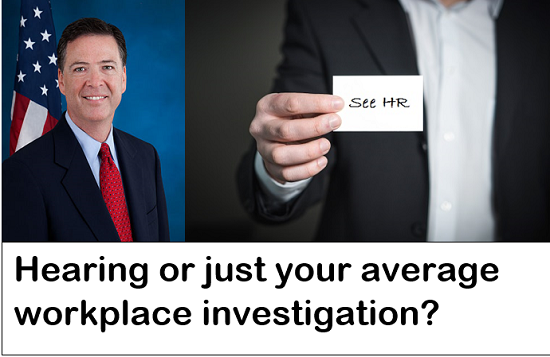Objective. Genuine. Thorough. The three keys to a successful workplace investigation. Granted, consequences of today’s Senate Intelligence Committee Hearing extend beyond those directly involved but also the security of a nation. But from a business perspective – Comey is a former employee, the government an employer, Trump a top executive, and the Senate Intelligence Committee HR in this serves as the “investigation”. How do you rate it?
It’s fair to say that no one looks forward to a workplace investigation. When handled correctly though, a well-done investigation helps to maintain the ethical integrity of an employer and its people, identifies areas where improvement is needed, and ensures everyone plays an active part guarding and creating their workplace culture. But when tensions are high – as they usually are when an investigation is underway, how are investigations to be handled? Here are some tips.
Investigate without bias.
Investigations usually fall to the company’s HR professional. But what happens if you do not have an HR person? Or, what if your company’s HR person is involved in the investigation? Should an HR professional be tasked with investigating his/her own boss? In such cases, look outside the organization for someone to conduct the investigation on the company’s behalf. An example being Uber’s relatively recent decision to hire former U.S. Attorney General, Eric Holder, to investigate allegations of discrimination and sexual harassment (which has already led to several changes). Often attorneys and HR consultants can assist in these investigations. Sign them to a non-disclosure and confidentiality agreement, ensuring findings remain confidential. While this may not protect a company from legal claims made by employees (active or former), it minimizes risk of an outsider person having loose lips. Additionally, hiring a person or firm to conduct an investigation suggests the company is making a good faith effort to maintain a fair and ethical culture, which can help should a formal legal matter later surface.
Seek truth, not agendas.
Unfortunately issues prompting an investigation are the result of a culmination of pitfalls. Often the issue could’ve been addressed or prevented altogether early on by better communication, transparency, accessibility, or even policy. Investigations can be painful for companies perhaps even more so for good-intended ones. It is important therefore, to keep in mind that investigations are part of the process in becoming a better company. Best to uncover an issue sooner versus later as problems often perpetuate over time. Do not censor investigation results for fear they will expose the company is imperfect. Be genuine in resolving issues and improving a company’s culture over all else. A good company can endure valuable criticism. A good investigator is an honest one. An investigation that instead seeks to vilify a scapegoat in hopes of allowing a company to save face ultimately serves no one, for long.
It ain’t over, ‘til it’s over.
The only thing worse than a workplace investigation is revisiting a workplace investigation. Buckle down, complete it, follow-up with all involved, and document it. While it is rare that post-investigation conversations are full of sunshine and rainbows, even bad news is better than the assumptions typically made accusers, or the accused. Investigate every aspect possible. Thorough investigations are often time consuming and yes, unpleasant. As mentioned previously however, issues prompting an investigation are likely due to a multitude of mishaps, oversights, and miscommunication. Botched investigations may be viewed as willful or retaliatory. Do not let your investigation be another symptom of company growing pangs. It may be the most costly one of all.
Need help with conducting your workplace investigation? Contact us today.
